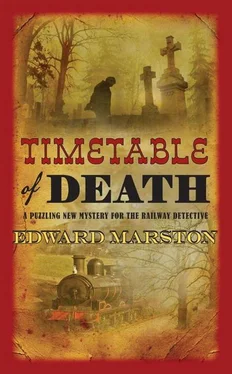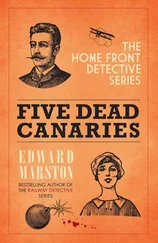Edward Marston - Timetable of Death
Здесь есть возможность читать онлайн «Edward Marston - Timetable of Death» весь текст электронной книги совершенно бесплатно (целиком полную версию без сокращений). В некоторых случаях можно слушать аудио, скачать через торрент в формате fb2 и присутствует краткое содержание. Год выпуска: 2015, ISBN: 2015, Издательство: ALLISON & BUSBY, Жанр: Исторический детектив, на английском языке. Описание произведения, (предисловие) а так же отзывы посетителей доступны на портале библиотеки ЛибКат.
- Название:Timetable of Death
- Автор:
- Издательство:ALLISON & BUSBY
- Жанр:
- Год:2015
- ISBN:9780749018122
- Рейтинг книги:4 / 5. Голосов: 1
-
Избранное:Добавить в избранное
- Отзывы:
-
Ваша оценка:
- 80
- 1
- 2
- 3
- 4
- 5
Timetable of Death: краткое содержание, описание и аннотация
Предлагаем к чтению аннотацию, описание, краткое содержание или предисловие (зависит от того, что написал сам автор книги «Timetable of Death»). Если вы не нашли необходимую информацию о книге — напишите в комментариях, мы постараемся отыскать её.
Timetable of Death — читать онлайн бесплатно полную книгу (весь текст) целиком
Ниже представлен текст книги, разбитый по страницам. Система сохранения места последней прочитанной страницы, позволяет с удобством читать онлайн бесплатно книгу «Timetable of Death», без необходимости каждый раз заново искать на чём Вы остановились. Поставьте закладку, и сможете в любой момент перейти на страницу, на которой закончили чтение.
Интервал:
Закладка:
Agnes lacked the spirit or the desire to stand up against her elder brother. She and Lydia had never been close. They had played together as young children but any bond between them had soon been stretched to breaking point. Lydia had been the clear favourite of their parents and of the wider family. She was more attractive, appealing, intelligent and venturesome. Living in her sister’s shadow, Agnes had been almost invisible. Since Lydia had shown little care or sympathy for her, she could expect none in return. In the years since she’d been cut off from her family, Lucas was the only member of it that she really missed. Significantly, he was the one who had got in touch with her.
While she had never really enjoyed the company of her sister or her elder brother, Lydia still had fond memories of Lucas Quayle. He was bright, engaging and had a streak of wildness that had got him into trouble in earlier days. Agnes had been horrified by some of his escapades and Stanley had been as outraged as their father but Lydia had always admired his youthful bravado and was sorry that it had slowly been suppressed. She and her younger brother had too much in common to grow completely apart. Lydia decided that she would like to see him again, but he was only one member of the family and she had good reason to avoid the others. On balance, therefore, she felt that it would be wiser to stay away from Nottingham.
Preoccupied as she was, Lydia hardly felt a shoulder brush hers.
‘Oh,’ said the man, raising his top hat, ‘I do apologise.’
‘That’s quite all right,’ she murmured.
‘It was my mistake.’
His voice was soft and educated and her first impression was that he was a polite, well-dressed man of middle years who’d been strolling harmlessly along the embankment when he’d made unintended contact with her. Lydia then saw the look in his eyes. It was no accident. Mistaking her for a prostitute, he had deliberately sought her out. His gaze was a compound of interest, invitation and sheer lust. A burning disgust coursed through her whole body but a stronger emotion followed. What she saw in front of her was not a complete stranger but the figure of her father, compact, stern, arrogant and entitled to everything he wanted in the way that he wanted it. As the man smiled at her and offered his arm, she pushed him angrily away and emitted a long, loud, high-pitched scream of pure hatred.
‘How much do you know about the Midland Railway?’ asked Haygarth.
‘I’m more well-informed than most people, I fancy.’
‘Big changes have taken place in the last decade.’
‘They were forced upon you, Mr Haygarth.’
‘I’d rather draw a veil over our former manager, if you don’t mind. George Hudson did wonderful things for us in the early days, one must acknowledge that, but he … left us with problems. That chapter in our history is closed.’
‘The succeeding one had much to recommend it.’
‘We like to think so.’
‘Mr Ellis was the ideal choice as your chairman.’
To Haygarth’s chagrin, Colbeck gave a brief and accurate outline of the recovery of the Midland Railway under its recently retired chairman, thereby robbing the other man of the chance to lay claim to some of the improvements. With Maurice Cope in attendance, they were at the company headquarters, Haygarth occupying the chair behind the desk like a usurper seated on a throne. He and Cope had been impressed and sobered by the inspector’s detailed knowledge of the history of the Midland. It warned them that they could not make unjustified assertions without being challenged by him.
After explaining what he’d done the previous day, Colbeck told them that Sergeant Leeming had made what appeared to be progress in Spondon itself. While Haygarth was pleased to hear it, Cope made no comment and remained watchful.
‘What it all boils down to,’ said Colbeck in conclusion, ‘is this. Should we be looking for someone inside the company or outside it?’
‘Oh, outside it, surely,’ bleated Cope, breaking his silence.
‘Do you agree, Mr Haygarth?’
‘You must leave no stone unturned,’ replied the other, sonorously.
‘Does that include Enoch Stone?’ asked Colbeck, unable to resist the comment and swiftly apologising for it. ‘So I have complete access to the company?’
‘Of course — Cope will make sure of that, Inspector.’
‘Yes,’ said Cope with a marked absence of enthusiasm. ‘You may call on me.’
‘During my brief conversation with him,’ said Colbeck, ‘Stanley Quayle was of the opinion that his father might have had enemies among his fellow directors. I’m not suggesting in any way that you incited them to commit murder, Mr Haygarth, but passions can run high in a contest and you wouldn’t be the first person embarrassed by the zeal of one of your supporters.’
‘I accept that,’ said Haygarth, urbanely, ‘but you’ll find no killers in my camp, Inspector. They are all law-abiding individuals.’
‘I can vouch for that,’ added Cope.
‘Then you’ll be happy to give me a list of all board members,’ said Colbeck.
‘Well …’ Cope looked for a prompt from Haygarth.
‘We’ll be quite happy,’ said the acting chairman. ‘We have nothing to hide.’ He shot Cope a glance before turning back to Colbeck. ‘What help have you had from Superintendent Wigg?’
‘Not a great deal,’ replied Colbeck. ‘Apart from the fact that he sent a copy of the post-mortem report, he’s done very little beyond mocking me for claiming that I had the name of a suspect.’
‘Oh?’
‘It was written on the back of a reward notice and delivered to my hotel. When I mentioned the name to the superintendent, he said the man probably never existed.’
‘And does he?’
‘Oh, yes. Stanley Quayle confirmed that.’
‘Who is the fellow?’
‘Gerard Burns.’
Haygarth frowned. ‘I’ve heard that name before somewhere.’
‘I gather that he’s a talented cricketer.’
‘Ah, that’s it, of course!’ said the other, snapping his fingers. ‘I have no interest in cricket myself but Vivian Quayle had something of an obsession about it. Burns was his head gardener, I think. Every summer Mr Quayle used to host a couple of cricket matches. His elder son, Stanley, used to captain a team made up largely from household servants and the estate staff. Because of this man, Gerard Burns,’ said Haygarth, ‘they won every match.’
‘He was good enough to represent the county, I hear.’
‘That may well be so, Inspector.’
‘Why was he named as a suspect?’ asked Cope.
‘He was dismissed by Mr Quayle,’ said Colbeck. ‘To get rid of his finest cricketer, he must have had good reason. I’m told that Burns left in disgrace.’
‘I knew nothing of that,’ claimed Haygarth. ‘Vivian Quayle and I saw very little of each other socially so I was not aware of events at his home any more than he knew about my private life. What about you, Cope?’
‘The name is entirely new to me, sir.’
‘Are you taking him seriously as a suspect, Inspector?’
‘I must do,’ replied Colbeck. ‘He appears to have had a motive and, being young and strong, would have the means to overpower his victim. Whether or not he had the opportunity to do so, of course, is another matter.’
‘Where is he now?’
‘He works in the garden at Melbourne Hall. I’ll visit him today.’
‘Good gracious!’ exclaimed Haygarth. ‘You’ll be in exalted company. Do you know who happens to live at Melbourne Hall?’
‘I’m afraid that I don’t.’
‘It’s the prime minister — Lord Palmerston.’
Having taken the wheelbarrow from the churchyard, Victor Leeming had borrowed two sacks of potatoes from a greengrocer so that he was pushing a substantial weight. He even covered them with a cloth. He took his cargo to the bottom of the hill and began the slow ascent. In reconstructing what he believed might have been the route taken by the killer, he hoped that he might jog the memory of a passer-by who’d happened to have been in the vicinity on the night of the murder. Disappointingly, the only villagers he encountered were two old ladies and a postman. They all asked him what he was doing but none was of any help to him.
Читать дальшеИнтервал:
Закладка:
Похожие книги на «Timetable of Death»
Представляем Вашему вниманию похожие книги на «Timetable of Death» списком для выбора. Мы отобрали схожую по названию и смыслу литературу в надежде предоставить читателям больше вариантов отыскать новые, интересные, ещё непрочитанные произведения.
Обсуждение, отзывы о книге «Timetable of Death» и просто собственные мнения читателей. Оставьте ваши комментарии, напишите, что Вы думаете о произведении, его смысле или главных героях. Укажите что конкретно понравилось, а что нет, и почему Вы так считаете.












